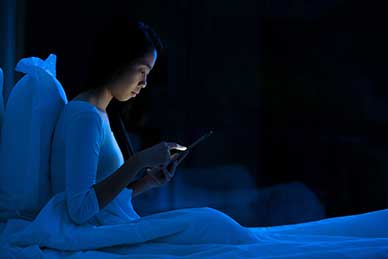Unless you live under that proverbial rock, you are likely familiar with the purported health dangers of smartphones. Although these devices make it easier to manage our busy lives and stay in contact with loved ones, more and more studies indicate that they may also pose health risks, even when not in use.
The Effects of Electromagnetic Radiation
Even when your phone is not in use, it’s still in contact with cellphone towers. It maintains this contact using a frequency known as electromagnetic radiation, allowing your phone to make its distinctive chime as soon as you receive a text or email. Electromagnetic radiation is very similar to microwaves. There have been conflicting studies regarding whether this type of radiation affects your health, but more recent research shows that the suspected health dangers of smartphones are likely a reality.
Exactly what are these health effects? Rats exposed to constant levels of this frequency of radiation develop brain tumors. There are also specific dangers for men who keep cellphones on their person or in a pocket, including infertility and potential testicular cancer. While our brains are partially protected by a skull, male reproductive organs have few defenses against the electromagnetic radiation, which can mutate sperm and make them unable to fertilize an egg. This is particularly unfortunate when you consider how many men keep their cellphone in their pants pocket.
Smart Phones and Sleep
 Smartphones can affect not just our long-term health, but our daily lives. They emit a blue-tinted light that is easy to read in almost any setting, much like computers and tablets. However, this light can affect our circadian rhythms and make it more difficult to get the sleep we need. Blue light has a huge effect on melatonin production, and can even shut it down completely. When you read on your smartphone or another device before bed, you are stopping your brain from making the hormone it needs to induce sleep. This is especially true for adolescents.
Smartphones can affect not just our long-term health, but our daily lives. They emit a blue-tinted light that is easy to read in almost any setting, much like computers and tablets. However, this light can affect our circadian rhythms and make it more difficult to get the sleep we need. Blue light has a huge effect on melatonin production, and can even shut it down completely. When you read on your smartphone or another device before bed, you are stopping your brain from making the hormone it needs to induce sleep. This is especially true for adolescents.
However, blue light is not the only way that a smartphone may interfere with your sleep. Electromagnetic radiation also may interfere with sleep. Children appear to be more affected, as their growing brain tissues absorb four times as much of this radiation as adults. In addition, children often lack the self-discipline needed to turn off these devices and go to sleep. It is important for children to go to sleep in a room free of televisions, tablets and other devices that could have long-term effects on both their circadian rhythm and whole-body health.
Mitigating the Health Dangers of Smartphones
This news may be shocking to people who always have their phone in hand. However, most of us either cannot or will not eschew our electronic devices completely. We need them not just for work and time management, but for much-needed recreation and fun. If you plan on keeping your smartphone in your pocket despite these health dangers, there are a few ways that you can lessen the potential damage to your body.
- Use a headset or speakerphone. Moving a source of radiation away from your body significantly reduces its effect on your cells.
- Keep your phone out of your pants pocket. Stash it instead in a bag, on your desk, or in a shirt pocket.
- Don’t sleep with devices in your bedroom. Smart phones are not the only sources of radiation; wireless modems and other devices also emit it. By keeping these in another room, you can reduce your exposure immensely.
- Avoid using your phone when it has a low signal. It has to send out more radiation to continue making contact.
- Limit your children’s usage of devices. Children are especially prone to negative effects from radiation because their bodies are still growing and their cells multiplying quickly.
It may be difficult to break the smartphone habit, but it will likely have a beneficial effect on your health. There are many ways to reduce the health dangers of smartphones, but simply putting it away may be the most effective.
 There are hundreds of books on the market instructing parents on how to get their children to sleep. Many of these are focused on infants, who notoriously keep their parents awake at night. However, sleep deprivation is an issue for older children as well. Six out of ten middle-schoolers and almost 90 percent of teens
There are hundreds of books on the market instructing parents on how to get their children to sleep. Many of these are focused on infants, who notoriously keep their parents awake at night. However, sleep deprivation is an issue for older children as well. Six out of ten middle-schoolers and almost 90 percent of teens  While melatonin
While melatonin  You may have noticed that you do not get jet lag every time you step on or off a plane. This is because there are a variety of factors that can make jet lag better or worse. For instance, researchers have found that
You may have noticed that you do not get jet lag every time you step on or off a plane. This is because there are a variety of factors that can make jet lag better or worse. For instance, researchers have found that  While it is difficult to change one’s innate sleep-wake cycle, the good news is that Advanced Sleep Phase Disorder can be treated. Most doctors recommend a combination of behavioral changes and other therapies. People should go to bed at the same time every night and awake at the same time in the morning, even on weekends or days off. This keeps the body from slipping into a less adaptive rhythm. Because it is almost impossible to change your sleep schedule in one sweeping shift, most experts recommend aiming to
While it is difficult to change one’s innate sleep-wake cycle, the good news is that Advanced Sleep Phase Disorder can be treated. Most doctors recommend a combination of behavioral changes and other therapies. People should go to bed at the same time every night and awake at the same time in the morning, even on weekends or days off. This keeps the body from slipping into a less adaptive rhythm. Because it is almost impossible to change your sleep schedule in one sweeping shift, most experts recommend aiming to  The link between cancer and the circadian clock is especially clear when you examine the relationship between sleep and cancer outcomes. Regardless of the type of cancer, having sleep apnea (and possibly other disorders that interfere with sleep) is
The link between cancer and the circadian clock is especially clear when you examine the relationship between sleep and cancer outcomes. Regardless of the type of cancer, having sleep apnea (and possibly other disorders that interfere with sleep) is  In adulthood, the ideal work schedule mainly depends on your unique circadian rhythm, which research has found is primarily
In adulthood, the ideal work schedule mainly depends on your unique circadian rhythm, which research has found is primarily  We do not currently know the ideal work schedule for people over the age of 65 because working past this age is a relatively new phenomenon. Humans were once lucky to live to this age, but now around
We do not currently know the ideal work schedule for people over the age of 65 because working past this age is a relatively new phenomenon. Humans were once lucky to live to this age, but now around